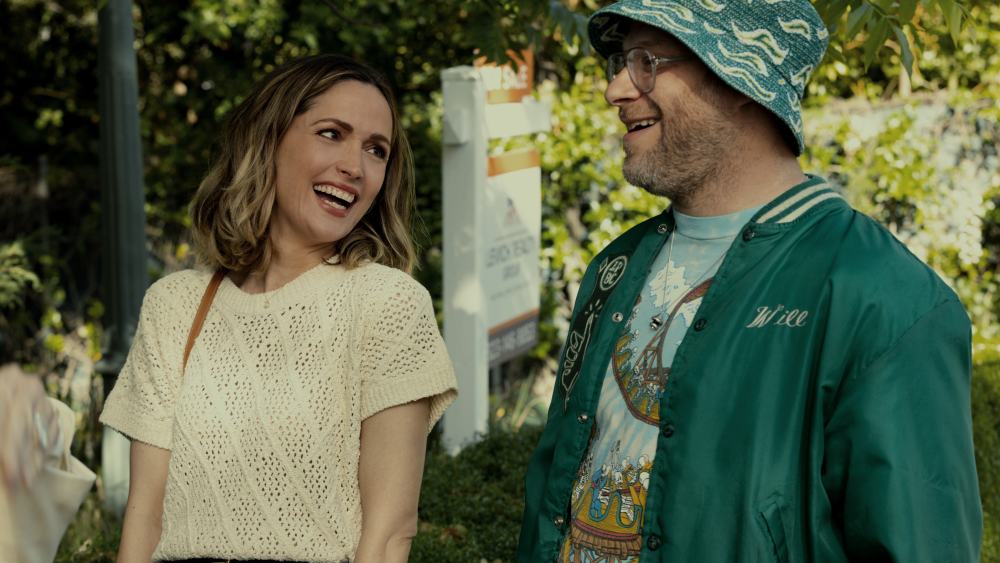The Apple TV+ comedy “Platonic” is a reunion of the 2014 movie “Neighbors” (and its 2016 sequel “Neighbors 2: Sorority Rising”), again pairing stars Seth Rogen and Rose Byrne with the writer and director Nicholas Stoller. But “Platonic” also models itself after another, more enduring classic: Nora Ephron’s “When Harry Met Sally,” a film explicitly referenced in the pilot of “Platonic” and the greatest work of art drawn from the essentially trite question of whether (straight) men and women can be friends. In “Neighbors,” Rogen and Byrne played spouses. In “Platonic,” they’re long-estranged besties who rekindle their codependent bond.
As premises go, it’s a thin one. Ephron’s opus is now 34 years old, and even “When Harry Met Sally” was less seriously engaged with the idea of friendship between the sexes than using the setup as a showcase for Ephron’s wit, Meg Ryan’s charm and Ryan’s chemistry with Billy Crystal. “Men and women don’t really hang out with each other at our age,” says Sylvia (Byrne), a former lawyer who’s now a stay-at-home mother of three. Her argument is half-hearted, unconvincing and immediately dismissed by her husband Charlie (Luke Macfarlane), who encourages Sylvia to get in touch with craft brewer Will (Rogen) in the wake of his divorce.
“Platonic” is the second series co-created by Stoller and Francesca Delbanco to name itself for a group of anxious, affluent friends entering middle age. (Stoller and Delbanco are married in addition to their professional partnership.) The first, “Friends From College,” was a total misfire scrapped by Netflix after two seasons. “Platonic” is sunnier and less sour than “Friends From College,” reflecting its cross-country move from New York to Los Angeles. But it has many of the same flaws, from an inconsistent tone to a lack of perspective on its characters’ high-class problems. Both issues are symptoms of the same underlying cause: an inability to make these obnoxious people as endearing to us as they are to each other, and apparently their creators.
When Sylvia reaches out to Rogen’s Will, the co-owner of a hip new bar, she’s at a crossroads of her own, having sent her youngest child off to kindergarten. Sylvia’s existential crisis is ripped straight from the pages of an Atlantic cover story from over a decade ago: she’s a professional who put her career on the back burner to focus on her family, only to look up 13 years later and wonder what’s next. “Platonic” uncritically cut-and-pastes this conflict into 2023, a time when audiences are much less likely to sympathize with Sylvia’s complaints about the home she and Charlie own in one of America’s most expensive real estate markets. The family’s search for a new, larger house takes up far more space in the season than it will in viewers’ minds.
It’s even harder to invest in Sylvia’s self-discovery when her character feels incoherent. She’s so chaotic, clumsy and at sea it’s hard to believe Sylvia made it through law school, let that she’s able to care for three other human beings. Will has a more plausible case of arrested development, having started a business with some buddies he steadfastly refuses to run like a business. But while “Platonic” gestures at their friendship as something Will and Sylvia escape into, self-destructively enabling each other while ignoring their actual problems, the show refuses to explore these implications. Instead, we get sitcom-style hijinks like an impromptu talent show and some prop work with scooters. The feeling is one of mandatory fun; the audience isn’t actually charmed, but forced to sit through antics they’re clearly meant to find charming.
No one outside the Will-and-Sylvia vortex seriously challenges them on their newfound coping mechanism. There are mild comments about how weird it is that Sylvia spends so much time with a guy she isn’t married to, but more specific, less retrograde observations go unmade. Charlie himself is a bland pushover, his marriage to Sylvia never shaded in enough to care for the fate of. (Will and Sylvia’s mutual obsession appears to be a reversion to an earlier pattern, but when the subject of Will’s divorce first comes up, Charlie never mentions it — a lost opportunity for exposition and emotional context.) Will’s divorce is the show’s inciting incident, but the particulars of why the relationship didn’t work out or how it’s affecting him are never established beyond a cliché rebound with a 25-year-old.
The supporting characters of “Platonic” are similarly skin-deep. Sylvia and Charlie’s oldest child has no interests beyond the occasional TikTok dance; Charlie’s coworkers are a Greek chorus of bad relationship advice. Like many half-hour shows in the streaming era, “Platonic” feels stranded between a tighter, more joke-forward M.O. and grounded psychological realism. Instead, it’s left with the worst of both worlds: neither the laughs of the former nor the insight of the latter. Two unpleasant people hanging out can be a good TV show. (Rest in power, “Difficult People.”) “Platonic” just isn’t.
The first three episodes of “Platonic” are now streaming on Apple TV+, with new episodes airing weekly on Wednesdays.

